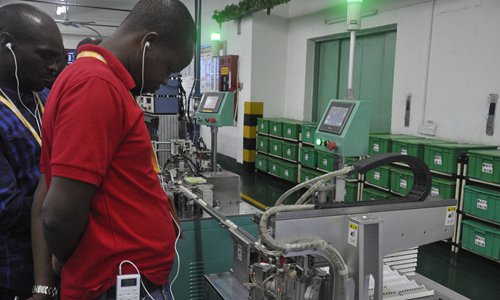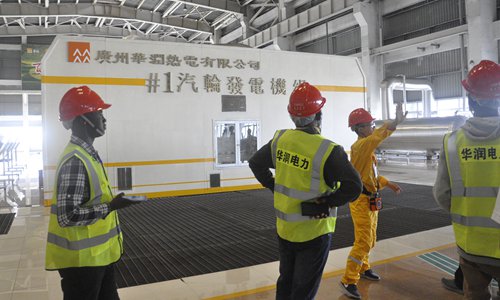IN-DEPTH / IN-DEPTH
African media professionals espy China's innovation

African members of the BRNN Media Workshop visit an assembly line of Galanz microwave oven in Shunde, South China’s Guangdong Province. Photo: Li Lei/GT
Participants of the Belt and Road News Network (BRNN) Media Workshop representing 14 African countries visited South China's Guangdong Province from September 24 to 27, to experience the innovative and high-quality development the coastal province is undergoing.During a visit to a thermal power plant of the China Resources (CR) Group based in Guangzhou, capital city of Guangdong Province, which works as an auxiliary project for Guangdong Pilot Free Trade Zone, African reporters praised the "green" and environmentally friendly thermal power plant for donning an innovative mode of development and environmental protection together.
According to the description, the thermal power plant of CR Group in Guangzhou is one of China's most effective and profitable power plants.
In terms of clean energy, the CR group has constructed a total of 83 wind farms, 20 photovoltaic power stations, two gas-fired power stations, and two hydropower stations.
According to Liu Qiuyang, a senior official of the CR group, the company will work further on energy utilization efficiency, reducing consumption and developing technology in capturing, collecting and utilizing carbon dioxide.
'Innovation is everywhere'
During the visit, African reporters showed great interest in the power plant's newly built sludge processing system, which uses circulated thermal power to dry waste sludge from urban areas and uses the mixture of dry sludge and coal as a fuel for power generation.
Maimbolwa Mulikelela, chief business reporter of Times of Zambia, said there are hydropower stations in Zambia, but not as large as the ones in China.
"Innovation is everywhere," Richard Ruhimbana, a senior reporter of Rwanda's The New Times, said after visiting the power plant. "Innovation is very important in environmental enhancement, product quality improvement and achieving better development," said Ruhimbana, adding "We need to learn from China on how to realize all the innovation."
Thierry Ramasawmy, a senior editor of the Mauritius Broadcasting Corporation, who had visited Guangzhou two years back, said that the city is undergoing a dramatic change. "Chinese experience is worth to learn and I hope China to cooperate with countries along the Belt and Road to develop clean energy."
Jackson Mwewa, a deputy chief sub-editor at the Times of Zambia, expressed his hope that the CR Group could help Zambia to solve the country's severe power crisis by converting its abundant coal resources into power.
Ma Li, chief representative of the CR Group in Guangdong Province responded that China has endured a similar kind of crisis before. However, after two decades of development of the energy sector, China has technologies to resolve the crisis in a high-quality manner. Ma said that they are expecting further detailed cooperation and contact with African countries.

Reporters of mainstream news outlets visit a thermal power plant of CR Group in Guangzhou. Photo: Li Lei
Path to industrialization
"Chinese enterprises and entrepreneurs should rediscover opportunities in Africa since the continent will bring the world fresh motivation," said Liang Zhaoxian, president of Galanz Group, one of China's largest home appliances suppliers.
"In the future, Africa will be the most promising market with the fastest development in the world and work as a new economic driver of global development," Liang told the Global Times during the BRNN Media Workshop members' visit to an assembly line of Galanz in Shunde on September 26.
As a leading brand in the world's microwave oven industry, the company is among the first batch of Chinese companies that ventured into the African market. Following the last 20 years' development, more than one million electric appliances are exported to Africa from its headquarters in Guangdong every year, according to company information Galanz sent to the Global Times.
Jean Tabaro, chief editor of Rwanda's Kigali Today Ltd, told the Global Times that he chose Galanz microwave for his kitchen, due to its design, affordability and high performance. "You can see Galanz sold in supermarkets in our country, and many restaurants use Galanz microwave ovens in Rwanda."
Sifiso Mahlangu, head of politics at South Africa's Independent Media, told the Global Times that he wants to buy a blender and toaster for his family as gifts. "They will be so happy to have them."
An electric parts factory of Galanz's microwave oven is equipped with highly automated assembly lines, and an assembly line is only supervised by one worker.
Edmund Smith-Asante, a reporter of Ghana's Daily Graphic asked Liang whether Chinese enterprises can help African countries realize automation as the African continent is in the middle of industrialization.
Concerning industrialization, Liang suggested African governments and relevant departments organize their entrepreneurs to visit other countries such as China, which achieved rapid economic development through reform and opening-up, and to learn from their experience in industrialization and chalk out development plan according to the condition of each nation.
"In the meantime, I hope African countries can improve people's education level and its support with infrastructure facilities," Liang added. "Only with sound education and proper infrastructure can the potential of Africa be achieved in a stronger and faster manner," Liang noted.

